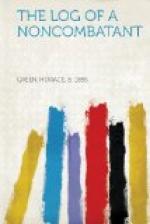At the first telegraph office across the Dutch border, I filed a cable story to the “Boston Journal”; and later started an account for the “New York Evening Post.” I had an idea that I would score a “beat” or “scoop” so that the people of the Back Bay could read of Antwerp’s fall over their coffee-cups the next morning. My cable account had too much inside information. There were in it too many facts concerning Winston Churchill’s visit, also information about the number of Royal Marines engaged, none of which it was thought proper to give out at that time. So the English censor refused to let it through. That, however, did not prevent the Dutch Cable Company from pocketing my two hundred guilders.
By the time I reached Rotterdam the word “refugee” had assumed a new and altogether nearer meaning. I had been in a besieged and captured city; I had mixed with homeless and starving people; I had seen houses crumble and burn; and ghastly human figures with their insides oozing away and the eyes staring vacantly.
As I lay in bed that night I could hear, and I still can hear, the scruff, scruff, and shuffle of feet as the compact body of this army—the army without guns or leaders—dragged slowly past my window at the Queen’s, the tinkle of ox-cart bells, the talk and babble of guttural tongues; the curses of the team drivers, the frantic cries of mothers who had lost their children in the scramble, the cries of young children who didn’t know what was wrong, but realized in their vague, childish way that something terrible was happening.
I could see, and I still can see, those big Belgian hounds sniffing along the outskirts of the crowd and plainly advertising for an owner; I can see other hounds with their heads thrown back wailing at the door of their deserted and abandoned homes. And I can see the Dutch border where Holland opened out her arms, and the Dutch peasants gave us rye bread and sandwiches and good long drinks of welcome milk.
Sometimes I can sit with my legs dangling over the stern of that old towboat barge on which I finally made my escape, and can visualize the blue-gray spire of the Cathedral of Notre Dame, standing, it seemed to me, a quiet sentinel over the ruins of the tortured city; and, then, as the old barge sweeps around the river’s bend, I can look back upon the last of Antwerp’s story written in flaming letters of red against the early morning sky.
Chapter VII
Spying On Spies
Less than forty-eight hours after the fall of Antwerp the wave of helpless humanity whose crest broke on the Belgian border had rolled over the entire length and breadth of Holland. Thousands of Belgian refugees wandered as far north as The Hague, where various Dutch relief committees and the American Legation at The Hague did their best to house the homeless and relieve the suffering. Dr. van Dyke rolled up his sleeves still farther and strained to solve the problem of the unemployed, sometimes, when a case interested him, turning his own pocket inside out.




